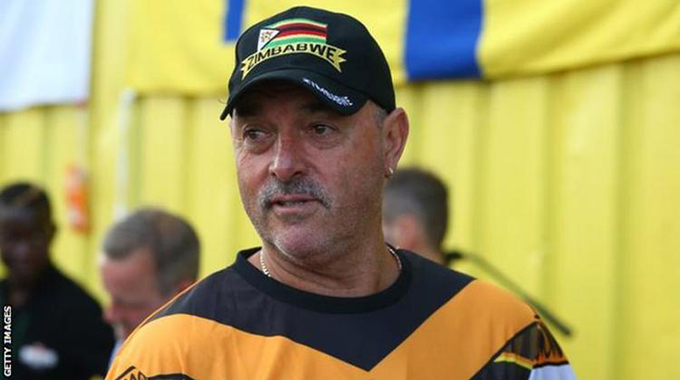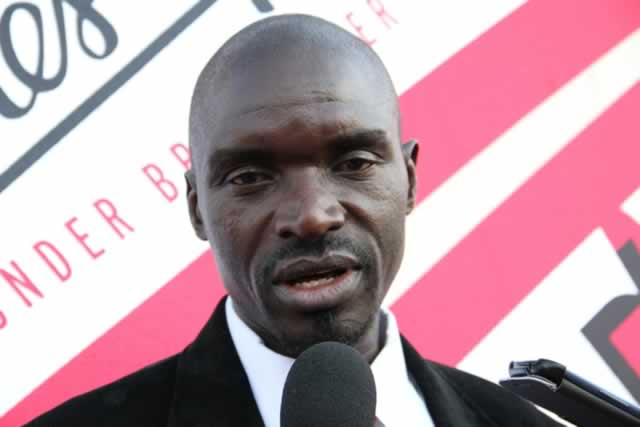For Zim cricket, it’s just more of the same

While cricket around the world is on hold, the lack of activity is really just more of the same for Zimbabwe.
A nation that holds so much promise, in the global game, has repeatedly seen its development stunted by a dearth of international fixtures.
And this lack of action has seen them now slip below the likes of Oman and the Netherlands in the ODI rankings.
“Obviously, we would like to see a situation where we’re playing more Test cricket, it’s a format that the players like, and a benchmark for all of us,” says national team batting coach Stuart Matsikenyeri.
“But we’ll take what we have, we’ll be missing out a lot over the next two years, looking at the calendar, but we’ll put our best foot forward whatever format we play.”
Zimbabwe’s two-Test series this year proved to be typically frustrating.
A 14-month absence from the most prestigious form of the game saw a hugely encouraging return in a two-match home series against Sri Lanka.
The first match saw Zimbabwe coming within an hour of batting out for a draw, while they were in a winning position in the second game but rain meant there was not enough time to bowl the visitors out.
Sri Lanka’s coach Mickey Arthur was full of praise for Zimbabwe at the time:
“If they play like that they’re going to test a lot of sides. I think they’re a dangerous young team now, they’ve got some very good players. I was very impressed,” said Arthur.
Zimbabwe then went to Bangladesh in February full of confidence, only to receive a thrashing in the one-off Test.
The one-day internationals were equally disappointing on the tour, with generally lifeless performances resulting in a 3-0 whitewash.
The latest rankings reflect Zimbabwe’s situation — bottom of the table of the 10 Test-playing nations by a considerable distance, and having played far fewer games than anyone else.
The one-day rankings make worse reading — Zimbabwe in 14th, with Oman a place ahead of them.
Go back to 1999, and Zimbabwe had their best-ever World Cup, finishing fifth in England.
A stunning spell from Henry Olonga resulted in a huge upset over India, followed by a superb 48-run defeat of South Africa.
The whole picture changed in 2004, when 13 of the senior white players quit the team in a dispute over selection policy.
The young team that took over had tough time, and Zimbabwe agreed to a voluntary Test suspension, which lasted for six years from 2005.
The team was, tantalisingly, still able to cause upsets in other formats though, including a five-wicket defeat of Australia at the 2007 Twenty20 World Cup.
But financial problems took a toll, with Zimbabwe Cricket accumulating a debt of about US$18m.
A big-spending franchise cricket system began in 2009, with a T20 competition that had guest players, including West Indies legends Brian Lara and Chris Gayle. But as the debt grew, there were numerous player strikes and the domestic season was shortened.
Players who might have represented Zimbabwe instead chose to play for England, including Gary Ballance and brothers Tom and Sam Curran.
Colin de Grandhomme now represents New Zealand.
In 2018 came a moment where cricket died for many of the country’s passionate supporters, a match that many still struggle to talk about now.
Rains came at lunchtime, in the final World Cup qualifier against the Emirates, before about 15 000 fans.
Zimbabwe were given a revised target — a challenging-looking one of 230 from 40 overs.
Most of the batsmen choked under the pressure, and Craig Ervine had to hit a six off the final ball for victory but could only scramble two.
The following year, in 2019, the women’s team came to the fore.
They hosted and won the continental qualifier for the Women’s T20 World Cup, earning a place at the global qualifier in Scotland.
But disaster struck again, as Zimbabwe Cricket was suspended by the ICC for government interference in the sport, after the Sports Commission suspended Zimbabwe Cricket and set up an interim board.
The women’s team was barred from competing in Scotland, the men’s team missed the 2020 T20 World Cup qualifier.
The Sports Commission backed down just in time to avert ZC having their ICC membership terminated.
With the ICC freezing funding to ZC, employees went for months without pay, and only in October will full funding be restored.
“I think we have gone past the worst, we have managed to weather the storm and we are in a better position than we were 18 months ago,” says an optimistic ZC chairman Tavengwa Mkhuhlani.
“When you see the players performing the way that they can it tells of a good story ahead.”
There are many issues that need to be addressed for Zimbabwe to achieve their potential.
A stronger domestic set-up and more international fixtures are key, to give the national team’s Indian coach Lalchand Rajput a chance to build a competitive and consistent side.
Hopes are there, too, that some of the country’s former stars might perhaps return one day, even Andy Flower, Zimbabwe’s greatest player.
Flower was the 2002 Wisden Cricketer of the Year, he once topped the Test batting rankings, and left the country in controversy in 2003 after the black armband protest at a Cricket World Cup game against Namibia in Harare.
Flower went on to coach England, where he lives, winning an Ashes series against Australia and the World T20 tournament in 2010.
“I wouldn’t say it’s a closed book at all,” says Flower. “Zimbabwe has a number of really difficult challenges, I want to visit Zimbabwe again, and who knows what’s going to happen in the future. I’d like to contribute to Zimbabwe cricket in some way, but I haven’t quite found the way to do that that fits for me or the country.” — BBC Sport.








Comments